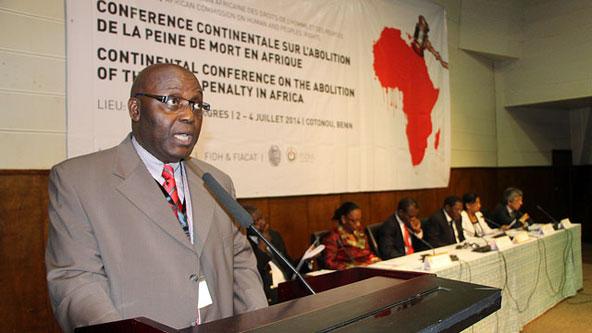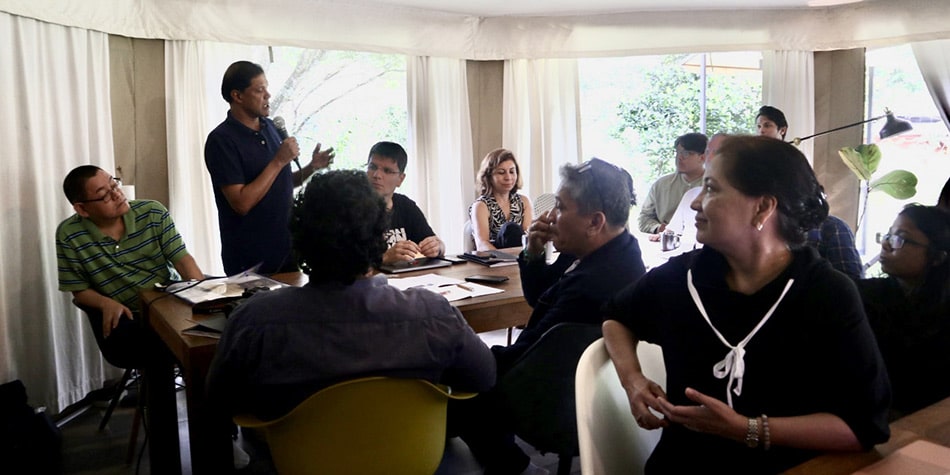
African leaders and abolitionists hold anti-death penalty summit in Cotonou
From July 2 to 4, 2014, the African Commission on Human and Peoples’ Rights (ACHPR), in cooperation with the Benin authorities, organised the first Continental Conference on the death penalty in Cotonou, Benin.
This Conference, which gathered representatives from African Union (AU) member States, parliamentarians, national human rights institutions and civil society organisations, opened the debate on the issue of the death penalty in Africa as well as the need for the adoption of a regional legal instrument on its abolition.
On 5 July 2014, 78 human rights organisations launch a “Manifesto for a Protocol to the African Charter on the abolition of the death penalty” supporting the adoption, by AU Member States, of a regional legal instrument expressly stating the abolition of the death penalty.
For Karim Lahidji, FIDH President, “the ongoing debates on the death penalty in Africa constitute an undeniable opportunity for African countries to strengthen the global and growing movement in favour of the abolition of the death penalty. Concrete actions and commitments must be made in favour of the adoption of an African Protocol explicitly abolishing the death penalty”.
African ownership of the abolitionist movement
For Paul Angaman, Chairperson of ACAT Côte d’Ivoire and member of FIACAT, “the adoption of an African Protocol on the abolition of the death penalty will allow AU Member States to develop a sense of ownership of the abolitionist movement and to strengthen the continental dimension of the abolition of the death penalty”.
The regional trend against the death penalty is a reality: 17 AU Member States have enacted laws to abolish the death penalty , including four States in the past five years, and 19 other member States are de facto abolitionist. Despite this encouraging trend towards abolition, resistance remains : in 2013, death sentences were passed in at least 19 African countries and executions were carried out in at least five of them.
“The abolition of the death penalty will soon become a matter of the past. It is important to continue debating openly with African States which still retain the death sentence and to explore, together with them, strategies to achieve abolition”, said Alice Mogwe, FIDH deputy secretary general, director of DITSHWANELO – The Botswana Centre for Human Rights and member of the ACHPR Working Group on the Death Penalty.
Among the strategies envisaged by the ACHPR Working Group on the Death Penalty to achieve continental abolition is the adoption of a regional legal instrument on abolition. In 2011, following a study on the situation of the death penalty in Africa, carried out with the support of FIDH, FIACAT and the World Coalition, the Working Group had recommended that African States adopt a Protocol to the African Charter on Human and Peoples’ Rights on the abolition of the death penalty.
According to Florence Bellivier, president of the World Coalition against the Death Penalty, “the adoption of an African regional instrument aiming at the abolition of the death penalty would help to clarify the legal means to achieve abolition. It would also be an encouraging instrument which would strengthen the advocacy for the universal abolition.”
Good news from Africa
The closing ceremony of the continental conference saw the participation of several African countries’ ministries of justice and foreign affairs. Madagascar’s Justice Minister Noëline Ramanantenasoa seized this opportunity to announce that her country is on the way to take the necessary steps towards abolition in law after signing the UN Protocol on the abolition of the death penalty in September 2012.
A bill to reform the penal code and abolish the death penalty is under review before the government presents it to the National Assembly for a vote in October 2014.
Good news came from Ghana as well. Ambassador Thomas Kwesi Quartey, the deputy minister for foreign affairs and regional integration, announced that a constitutional reform including the abolition of the death penalty will be submitted to a popular vote through a referendum in the coming weeks.






